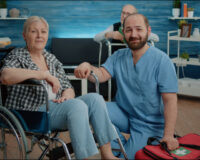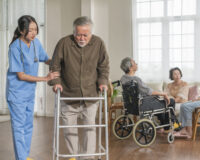The journey to recovery doesn’t end when a patient is discharged from the hospital. Surgery is only half the journey the real healing begins at home. Post-operative care at home is a crucial phase where your loved one’s comfort, safety, and recovery are most at stake. With the right guidance and support, families can ensure a smoother, complication-free recovery.
According to the Ministry of Health & Family Welfare, effective home care after surgery can reduce hospital readmissions by nearly 30%, underscoring the value of proper planning and professional support in post-surgery care at home.
Why Post-Operative Care Matters?
After a patient is discharged, the body is still vulnerable. The risks of infection, pain, immobility, and emotional stress are high if not managed carefully.
Here’s why post-operative care is vital:
- Prevents infections and complications
- Supports faster healing and better pain management
- Reduces dependence on hospitals
- Provides emotional stability in a familiar environment
- Enables cost-effective recovery with minimal disruption
Checklist for the First 48 Hours After Discharge
The first two days after surgery are the most sensitive. Families must prepare in advance to ensure safety and peace of mind.
Home Preparation:
- Clean, clutter-free room
- Comfortable bedding at accessible height
- Emergency contacts and medications in reach
- Functional medical equipment (walker, bedpan, etc.)
Vital Monitoring:
- Regular checks on blood pressure, temperature, heart rate
- Observe breathing patterns and alertness
Pain & Rest Protocols:
- Follow the prescribed pain relief routine
- Encourage deep sleep and avoid screen-time or loud environments
- Limit visitor interactions to reduce fatigue
Wound Care & Dressing Tips for Infection Prevention
Infections are among the most common post-surgery complications, but they can be prevented with the right hygiene and wound care practices.
Wound Care Essentials:
- Wash hands thoroughly before and after changing dressings
- Use sterilized gloves and prescribed antiseptic solutions
- Do not remove surgical dressing without doctor’s advice
- Keep the wound dry and exposed to fresh air (if advised)
Warning Signs of Infection:
- Redness or swelling around the wound
- Pus or unusual discharge
- Persistent fever or body chills
- Foul smell from the dressing
According to WHO India, surgical site infections can delay recovery by 7–10 days and may lead to extended hospitalization if ignored.
Pain & Medication Management at Home
Pain is part of the recovery process but should not interfere with healing or quality of life. Managing it well is key to restoring strength and comfort.
Best Practices:
- Follow the exact dosage and timing of pain medications
- Use pain scales to track changes and communicate with your doctor
- Avoid self-medication or over-the-counter painkillers without consultation
- Keep a medicine chart to prevent overlap or missed doses
Tip: Use a reminder app or family schedule to manage medications efficiently.
Diet, Fluids & Nutritional Recovery Plan
What your loved one eats plays a powerful role in how quickly they regain energy and rebuild immunity.
Post-Operative Diet Tips:
- Include protein-rich foods (dal, paneer, eggs, lean meat)
- Add iron & vitamin C (green leafy vegetables, citrus fruits)
- Small, frequent meals work better than large portions
- Avoid spicy, oily, and processed foods
Hydration Guidelines:
- At least 8–10 glasses of fluids unless restricted
- Coconut water, soups, and herbal teas are excellent choices
Mobility Exercises & Physiotherapy
Movement is medicine. Early mobility after surgery can prevent blood clots, lung infections, and muscle stiffness.
Safe Exercises to Start With (as per doctor’s advice):
- Bedside leg lifts and ankle rolls
- Guided walking with a walker or cane
- Breathing exercises to expand lung capacity
- Physiotherapy sessions (online or at home)
Even short walks around the room can stimulate healing and uplift mood.
When to Call the Doctor: Warning Signs
Not every discomfort means trouble, but being alert to red flags can prevent serious setbacks.
Contact Your Doctor If:
- Sudden or worsening pain
- Heavy bleeding or persistent vomiting
- Chest pain or difficulty in breathing
- No bowel movement for over 3 days
- Signs of depression or mental distress
Keep emergency numbers and your surgeon’s contact saved and accessible.
Professional Help: How CFYI Supports Recovery at Home
We understand that families may feel overwhelmed by the demands of post-surgery recovery. That’s where our trained professionals come in offering personalized, compassionate, and professional home care services across cities like Ahmedabad, Baroda, and more.
CFYI Services Include:
- Wound dressing and infection monitoring
- Physiotherapy sessions for faster mobility
- 24×7 nursing support for critical care
- Medication assistance and progress tracking
- Nutrition guidance by trained health professionals
By letting us handle the post-operative care complexities, families can focus on what matters most, healing with love, not stress.
Conclusion
Healing doesn’t stop at hospital doors, it happens the best in the comfort of home with the right care. From wound management to mobility support, families can play a powerful role in recovery. But you don’t have to do it alone. Reach out to CFYI for dedicated, expert-led post-surgical care that brings hospital-level support to your doorstep.





